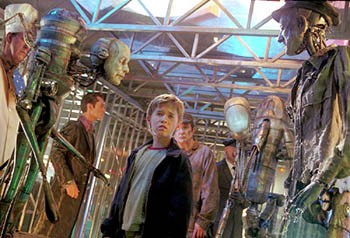Robot Oedipus
‘A.I.’ is Spielberg at his most conflicted
By
IF ANY OF THIS summer’s blockbusters deserves Freudian analysis, A.I.: Artificial Intelligence is it. Made as a kind of joint project between Steven Spielberg and the now deceased Stanley Kubrick, the film is as much Oedipus 2050 as a robot Pinocchio.
The film opens in an upper-class home of the near future. Aspects of Kubrick’s design stick out at odd angles in this flick. In these first moments, Kubrick would have brought out the ice in these scenes of IKEA über alles, of Scandinavian blonde wood everywhere. Spielberg just seems to think it’s swank.
All that depressing birch surrounds the sexless marriage of an overworked robot-company executive (Sam Robards) and a grieving mother named Monica (Francis O’Connor). Since her son is in deep freeze, awaiting the cure for a virus, she’s allowed to beta-test the latest generation “meca”–a boy cyborg named David (Haley Joel Osment) that has the ability to love and respond to love.
When Monica’s natural kid, Martin (Jake Thomas), is thawed out, the biological boy’s sibling rivalry poisons the relationship between robot and mother. Monica abandons David in the woods, and he heads off to find “The Blue Fairy” from Pinocchio, in hopes of becoming a real boy.
Shortly, David and his talking teddy bear–a grave toy voiced by Jack Angel–are caught by human hunters. Antique robots are rounded up for demolition derby-style public destruction by a slouch-hatted showman (Brendan Gleeson, A.I.‘s Stromboli). The burning “alive” of a sweet-faced nanny robot in this scene demonstrates that A.I. is absolutely not for young children. (So does an earlier scene where the angelic face of Haley Joel Osment melts right on camera.)
When David escapes this Roman orgy, he leaves with the fugitive sex-bot Gigolo Joe, played by Jude Law. Law is the picture’s much-needed wit and irony–otherwise, A.I. is as serious as church.
The cyborg lover is the film’s Lampwick, but he’s a courtly rogue. A.I.’s best moment has him seducing a sad girl (an unbilled Beverly D’Angelo, I believe), who still carries the bruises her human boyfriend gave her. Joe knows a little dance, a little Shakespeare; he’s programmed with an MP3 of Dick Powell singing “I Only Have Eyes for You.” While it’s not easy to upstage a phenomenal kid actor like Osment, Law does it.
Unfortunately he’s yo-yoed out of the picture after a too-short scene at Rouge City, the Pleasure Island/sex-resort. This town is only a pit stop before David is led off to his final destination–the drowned city of Manhattan, inundated by the melted ice caps.
The stickiness of the plot–and it would be even stickier if it weren’t for Osment–is amplified by John Williams’ music. (“Use this syrup before the expiration date of 2020,” a friend wisecracked.)
In patches, A.I. has more mood than Spielberg’s evinced in years. When he’s obsessively retelling the Disney fairy tales, when he’s compulsively memorializing the Holocaust, the director is passionate with horror. Here, the ending scenes are so awash with filial love that it’s impossible to weep, or even to cringe.
You can’t call it schmaltz; it’s too heartfelt. I feel as if I’ve underestimated the man’s agony. A.I. is Spielberg fingering the wounds of a childhood that will, I guess, never heal.
From the June 28-July 4, 2001 issue of the Northern California Bohemian.









